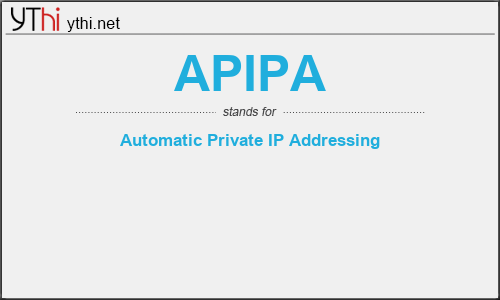What does APIPA mean? What is the full form of APIPA?
The full form of APIPA is Automatic Private IP Addressing.
Automatic Private IP Addressing (APIPA) is a feature of Windows-based operating systems (included in Windows 98, ME, 2000, and XP) that enables a computer to automatically assign itself an IP address when there is no Dynamic Host Configuration Protocol (DHCP) server available to perform that function. APIPA serves as a DHCP server failover mechanism and makes it easier to configure and support small local area networks (LANs).
If no DHCP server is currently available (either because the server is temporarily down or because none exists on the network), the computer selects an IP address from a range of addresses (from 169.254.0.0 – 169.254.255.255) reserved by the Internet Assigned Numbers Authority (IANA) for that purpose. The client uses Address Resolution Protocol (ARP) to ensure that the chosen address is not already being used by another network computer. Once the computer has assigned itself an IP address, it can communicate over TCP/IP with other computers on the LAN that are either configured for APIPA or are manually set to the correct address range and a subnet mask value of 255.255.0.0. APIPA is enabled by default, but can be disabled in some cases. DHCP messages notify the user when they are switched between DHCP addressing and APIPA.
APIPA
means
Automatic Private IP Addressing![]()
Translate Automatic Private IP Addressing to other language.


Leave a Reply
You must be logged in to post a comment.